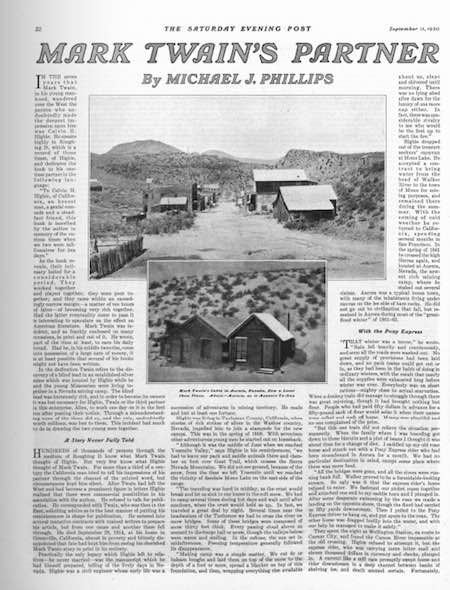The Young Mark Twain: Amusing Scoundrel, Storytelling Genius, or Both?
When writing under his pseudonym “Mark Twain,” Sam Clemens liked to present himself as an amusing scoundrel: self-centered, irreverent, often blasphemous, and thoroughly lazy.
Readers believed he was none of these things. The sheer volume of his literary output argued for his industry. And anyone who read his works knew the author was a broadminded humanitarian, earnestly concerned for the downtrodden of the world. True, he had a cynical streak and was blisteringly critical of religions, but no one doubted his devotion as a husband and father.
But that was the mature writer. As a young man, Clemens often showed traits that more closely resembled the comical Twain. According to the man with whom Clemens shared a cabin and silver mine, the 26-year-old Twain was indolent, irresponsible, and self-serving — but entertaining.
Michael J. Phillips’ Post article, “Mark Twain’s Partner,” which appeared in 1920, cites Calvin Higbie’s reminiscences of young Sam Clemens.
In 1861, Clemens unexpectedly showed up at Higbie’s cabin. He’d been sent by his older brother, Orion, to work a mine Orion and Higbie jointly owned.
To Higbie, Twain seemed brash, presumptuous, and lazy. He spent his days on the upper bunk bed — which had been Higbie’s before Twain appropriated it — telling one story after another. Higbie couldn’t stay irritated with the young man, though, because the stories were so entertaining. In fact, Higbie found he was spending so much time listening to Twain he wasn’t getting his own work done.
Twain wasn’t idle, however. In these days, he began writing pieces that were published in the Virginia City Enterprise. Some of them were recycled in the book Roughing It, Twain’s account of his life in the west.
He wrote how he and Higbie had made and lost a fortune when he failed to file a claim on a rich mine.
As Twain tells it, Higbie left him a note in their cabin directing him to file the claim, but Twain found it too late. Before he could reach the county office, others had claimed the mine.
Higbie’s version disagrees. He claims that Twain first agreed to file the claim, but then became distracted and simply forgot to complete the paperwork.
Who are we to believe?
We don’t know Higbie, but we know Twain and his genius for storytelling. Roughing It isn’t autobiographical, but rather a creative work that contains travel writing, anecdotes, and tall tales.
Both men claim Twain was responsible for losing the mine, but it didn’t appear to ruin their friendship. In the Post article, Higbie offered a good excuse for Twain not filing a deed for the mine. Twain, for his part, dedicated Roughing It to Higbie, “an honest man, a genial comrade, and a steadfast friend.”

Featured image: Library of Congress